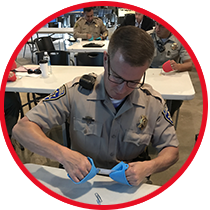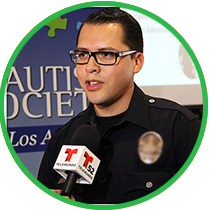Our Program
How it works
Engaging training helps peace officers
recognize & respond to those with autism
Autism is on the rise, with as many as 1 in 64 children in the U.S. now affected by Autism Spectrum Disorder (ASD). As many of 50,000 of these children turn 18 every year. Individuals with ASD are particularly vulnerable in police encounters and emergency situations due to features of their disorder. Police departments are challenged to safely and effectively respond to the growing population of individuals on the spectrum, who are growing up.
Law enforcement officials want and need training to increase positive outcomes and minimize risk in calls involving individuals with ASD. Experience Autism® is an engaging, hands-on training that helps law enforcement professionals and other first responders recognize the signs of autism and respond to the needs of this population. Officers experience different features of ASD through Experience Autism® simulations. They develop empathy and identify how to best meet the multiple needs of those with ASD during contact.
You may have heard of the Los Angeles Police Department’s celebrated Mission Possible program. Experience Autism® is the foundation Mission Possible, created by autism specialist Emily Iland, M.A. Officers at Mission Possible and other training events report that Experience Autism® can help prepare law enforcement professionals and other first responders for real-life contact with individuals with ASD.
Click on the videos below to see Experience Autism® in action.
Plan Your Event
Law enforcement agencies host an Experience Autism® training event for up to 50 personnel. Participants engage in 4 to 6 learning experiences that simulate what it is like to have Autism Spectrum Disorder (ASD). The event lasts from 3.5 to 4 hours and is eligible for training credits.
We Make It Happen
Event activities are coordinated and facilitated by Experience Autism® creator Emily Iland with the assistance of peace officers from the host/partner organization. Simulations are ideally experienced in small group rotations, but other options can be arranged. Local advocates, parents and individuals with ASD may also assist.
Here’s a Preview of some of the Experience Autism® Activities

Clip It
Officers wear oven mitts on their hands and try to attach paper clips to an index card. This simulates fine motor skill impairment, and officers get a sense of how frustrating it may be Next, officers try the same task using binder clips, to understand accommodation.

Write On
Each officer is given a simple task to do: write his or her own name. The twist is that they write their name with a crayon on a sticky note stuck to their forehead. Officers explore how different people process information and their own ability to meet an unexpected challenge.

Say What?
Officers are asked to rephrase a sentence, omitting a certain letter. This experience shows what a language delay and processing problems feel like. Officers also get a sense of the difficulty that people with ASD may have when responding to questions.